Beer and now: New lease of life for old brewery sites
- Published
Breweries often dominated their communities, their closures mourned not just for the loss of jobs but for the loss of a household name. What happens to them afterwards varies as widely as the beers they once produced.
A decade after model Melanie Sykes leaned out of an ice cream van in the middle of a desert, external, offered a sweating athlete a pint of Boddingtons and asked: "Do you want a flake in that, love?" the brewery that had been the beer's home was no more.
By the end, the Strangeways site was reportedly too valuable not to sell. Production was moved, grand plans were mooted and now there is a Travelodge and a car park where the "cream of Manchester" once lived.
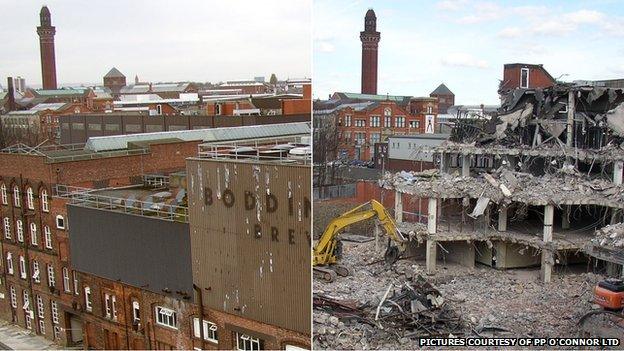
Between former breweries and ambitious plans for their future stands the hurdle of planning permission.
Hartley's in Ulverston, Cumbria - later taken over by Stockport firm Robinsons before closing in 1991 - could end up as a supermarket.
But the scheme is not universally popular. Approved at district level by a narrow margin of seven votes to six, it is opposed by the town council and the campaign group Keep Ulverston Special.
This one might have to wait a bit longer for its new lease of life.
One organisation that does not want breweries to turn into supermarkets is the Campaign for Real Ale (Camra).
Spokesman Neil Walker said: "Breweries are a hugely important part of the UK's cultural heritage and many of the buildings which housed them are of great historic significance.
"Of course Camra want to see as many breweries as possible thriving.
"But when a historic brewery does close its doors it is essential we protect them from being converted to uses which don't celebrate the building's past, such as convenience stores or supermarkets."
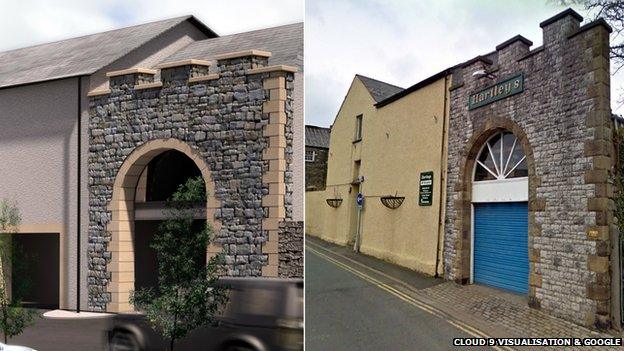
Sunderland's Vaux brewery has also been the subject of argument and debate - ever since it closed in July 1999 after three unsuccessful management buy-out attempts and 162 years of brewing.
Supermarket chain Tesco bought the site in 2001 but, failing three times to get planning permission, gave up and sold the land to the city council. The authority says it has plans to create a business district but the city has now been waiting three years to see work start.
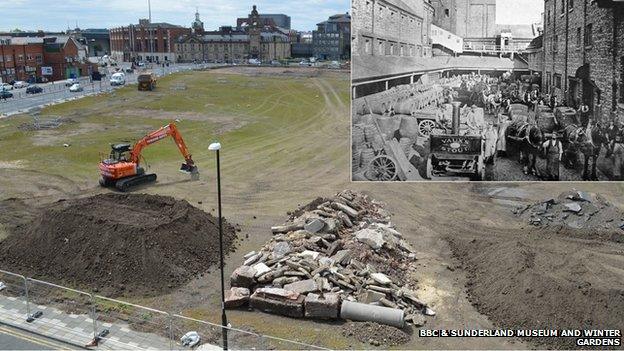
Vaux was one of England's many family breweries and Ward's in Sheffield became one of an increasing number of brewing "step-children". Many old firms were being taken over by larger and larger parent groups.
The Sheaf Brewery was bought by the Sunderland firm in 1972, after 132 years of independence. The two breweries survived for nearly three more decades before Vaux, deciding to concentrate on its hotels and restaurants, closed them both.
Ward's is remembered with a surviving arch leading to the housing and leisure development beyond.
Alastair Bonnett, professor of social geography at Newcastle University, believes the loss of such landmarks can have a powerful negative impact.
"People become disorientated," he said. "They lose a connection to their city. This creates a sense of alienation which can have spin-off effects in terms of losing a sense of community.
"It's not an argument for preserving everything - that's not a practical proposition - but it's an argument for people to realise they have huge cultural capital invested in them."
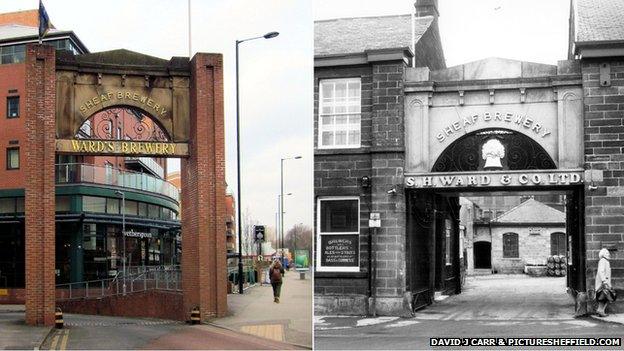
Newcastle Brown Ale had been bottled at the Tyne Brewery since 1927. But in 2005 owners Scottish & Newcastle (S&N) outraged drinkers by moving production out of the city to Dunston in Gateshead.
Taking "brown dog" from Newcastle was never popular but its fans still manage to imbibe tens of millions of bottles a year even now the beer is produced at John Smiths in Tadcaster.
It is another example of the convoluted brewing family tree - no sooner had John Smiths been taken over by S&N than they in turn were bought by multi-national brewing giant Heineken.
Part of the old Tyne Brewery is now a hotel, identified by the beer's traditional blue star. The adjacent bottling plant is being developed as Science Central, a business and new technologies hub.
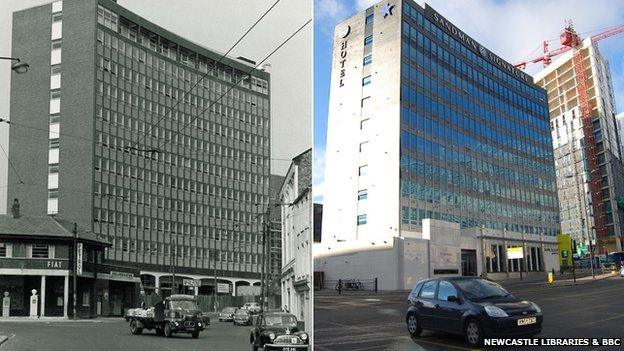
There is often a certain sentimental attachment to a local brewery.
Shipstone's Star Brewery - known affectionately as Shippo's - was closed in 1991 but, within four years, auctioneers John Pye and Sons had moved in and were "restoring the site to its former glory", keen to safeguard its "heritage, history and community focus".
They have followed the brewery's tradition of putting their name on the local football shirts, sponsoring both Nottingham Forest and Nottingham boxer Carl Froch.
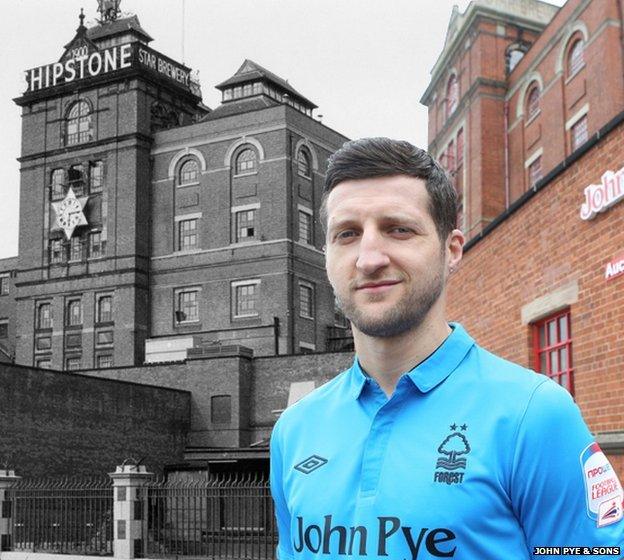
The Tetley in Leeds is one of the more recent rejuvenation success stories.
Once the headquarters of Tetley bitter, it reopened in November as a £1.5m centre for contemporary art which hopes to attract 45,000 visitors a year - a far cry from the 170 who worked there in its last days as a brewery.
So loved was it that, when it closed in 2011, the local branch of Camra held a silent "wake" at the brewery gates.
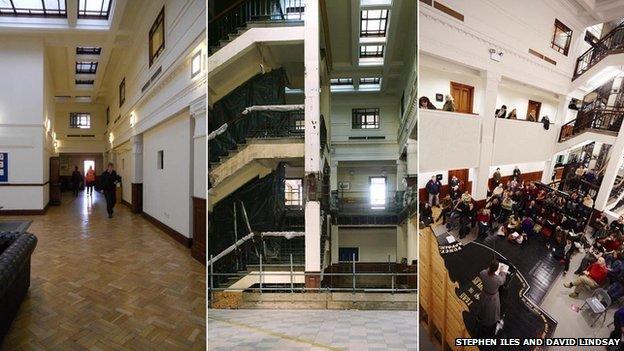
Images courtesy of The Tetley
Prof Bonnett, whose research includes the politics and geography of nostalgia and memory, believes sympathetic regeneration is key to avoiding what he terms "blandscapes".
"There are still some people with a 1960s or 70s world view in which you 'cleanse' the landscape and try to build anew. I think that's very, very dated," he said.
"It happens time and time again. After a while you get blandscapes - generic zones that people find it hard to develop relationships with."
He added: "If they had a bit more [character] about them it wouldn't be so egregious. They almost seem to be deliberately trying to create 'nowheres' in the landscape.
"They replace industrial architecture which is iconic with buildings built on the cheap."
- Published12 December 2013
- Published28 November 2013
- Published8 July 2013
- Published25 April 2013
- Published21 October 2012